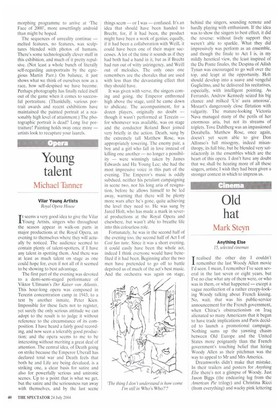Young talent
Michael Tanner
Viler Young Artists Royal Opera House
It seems a very good idea to give the Vitar Young Artists, singers who throughout the season appear in walk-on parts in major productions at the Royal Opera, an evening to themselves where they will actually be noticed. The audience seemed to contain plenty of talent-spotters, if I have any talent in spotting them. And there was at least as much talent on stage as one could hope for, even if not all of it seemed to be showing to best advantage.
The first part of the evening was devoted to a demi-semi-staged performance of Viktor Ullmann's Der Kaiser von Atlantis. This hour-long opera was composed in Terezin concentration camp in 1943, to a text by another inmate, Peter Kien. Impossible for these facts not to register, yet surely the only serious attitude we can adopt to the result is to judge it without reference to the circumstance of its composition. I have heard a fairly good recording, and now seen a tolerably good production; and the opera seems to me to be interesting without meriting a great deal of attention. The central idea, of Death going on strike because the Emperor Uberall has declared total war and Death feels that both he and Life are being devalued, is a striking one, a clear basis for satire and also for powerfully serious and unironic scenes. Up to a point that is what we get, but the satire and the seriousness run away with themselves, and by the last scene
things seem — or I was — confused. It's an idea that should have been handed to Brecht, for, if it had been, the product might have been a work of genius; equally, if it had been a collaboration with Weill, it could have been one of their major successes. A lot of the time it sounds as if they had both had a hand in it, but as if Brecht had run out of witty astringency. and Weill out of melodies. The only ones one remembers are the chorales that are used with less than the devastating effect that they should have.
It was given with verve, the singers coming and going, the Emperor enthroned high above the stage, until he came down to abdicate. The accompaniment, for a dozen players, originally no doubt — though it wasn't performed at Terezin — for whomever was available, was on stage and the conductor Roland Boer joined very briefly in the action. Death, sung by the extremely tall Matthew Rose, was appropriately towering. The enemy pair, a boy and a girl who fall in love instead of killing one another — no longer a possibility — were winningly taken by James Edwards and Ha Young Lee: she had the most impressive voice in this part of the evening. The Emperor's music is oddly subdued, neither his petulant campaigning in scene two, nor his long aria of resignation, before he allows himself to be led away, warning that there will be plenty more wars after he's gone, quite achieving the level they need to. He was sung by Jared Holt, who has made a mark in several productions at the Royal Opera and elsewhere, but wasn't able to breathe life into this colourless role.
Fortunately, he was in the second half of the evening too, the second half of Act I of Cosi fan tutte. Since it was a short evening, it could easily have been the whole act, indeed I think everyone would have benefited if it had been. Beginning after the two men have pretended to go off to battle deprived us of much of the act's best music. And the orchestra was again on stage, behind the singers, sounding remote and hardly playing with enthusiasm. If the idea was to show the singers to best effect, it did the reverse: without lively support they weren't able to sparkle. What they did impressively was perform as an ensemble, and though the finale to Act I is, in my mildly heretical view, the least inspired of the Da Ponte finales, the Despina of Ailish Tynan was encouraged to go well over the top, and leapt at the opportunity. Holt should develop into a suave and vengeful Guglielmo, and he delivered his recitatives, especially, with intelligent pointing. As Ferrando, Andrew Kennedy seized his big chance and milked lin' aura amorosa', Mozart's dangerously close flirtation with vulgarity. The mature-looking Victoria Nava managed many of the perils of her enormous aria, but not its streams of triplets, Tove Dahlberg was an impassioned Dorabetla. Matthew Rose, once again, doesn't yet seem able to give Don Alfonso's full misogyny, indeed misanthropy, its full bite, but he blended very satisfactorily in the ensembles which are the heart of this opera. I don't have any doubt that we, shall be hearing more of all these singers, artists; I wish they had been given a stronger context in which to impress us.


























































 Previous page
Previous page